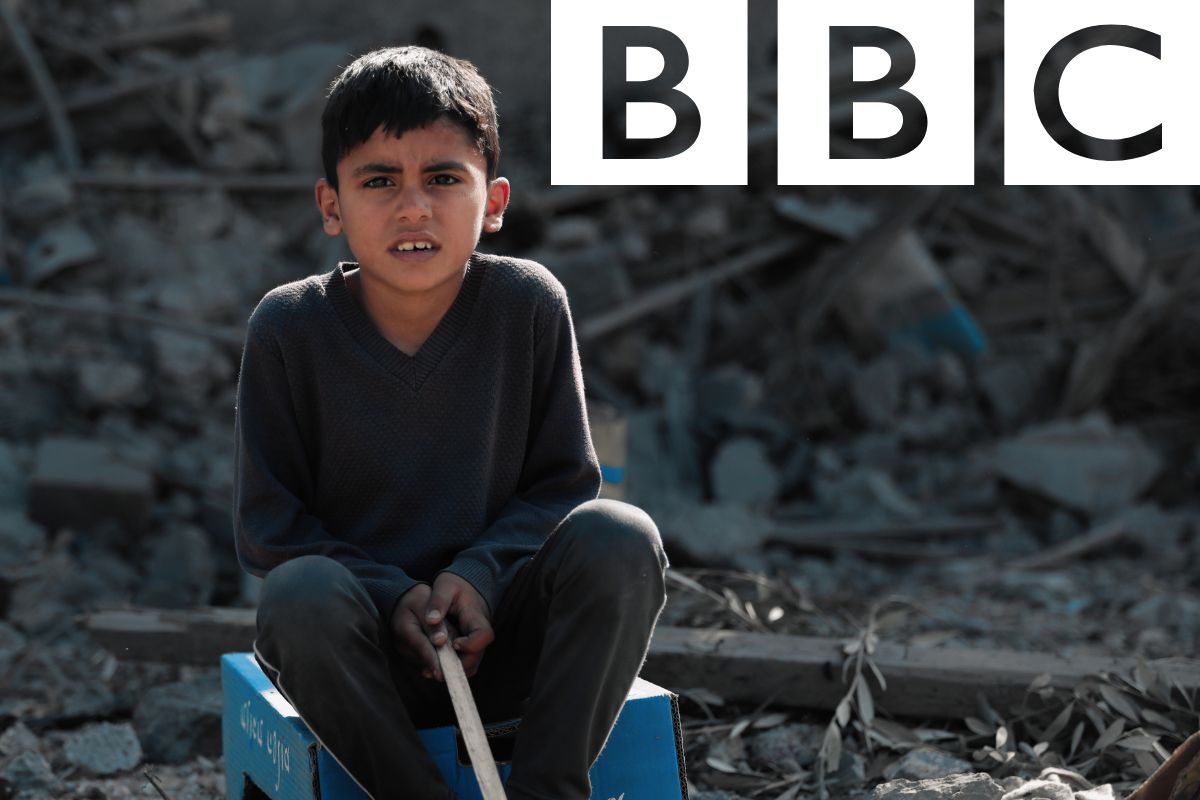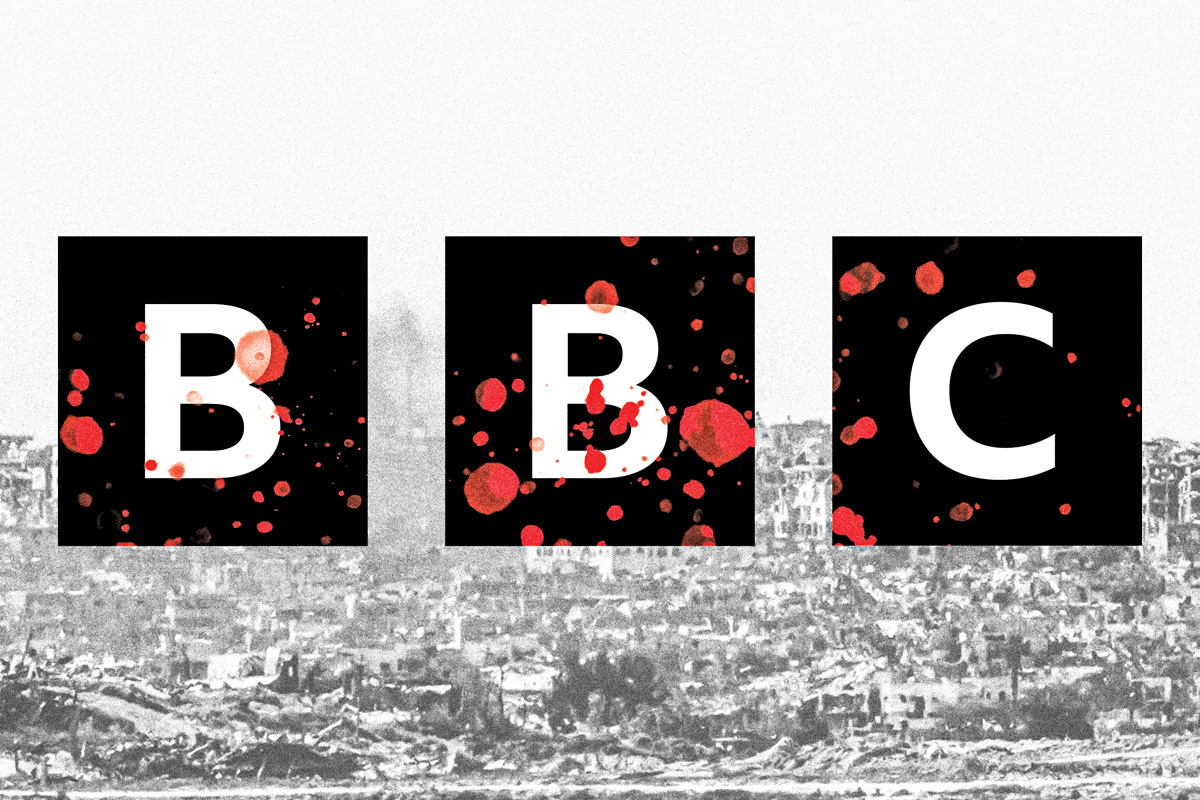Gary Lineker, Huw Edwards, Masterchef. Kneecap and Bob Vylan. Journalists in revolt. Commissioned documentaries cancelled. Cuts, declining TV license payers, declining viewership.
From every angle, the British Broadcasting Corporation (BBC) – one of the main pillars of the British establishment – is in perpetual crisis. This is no accident.
The eroding legitimacy of the BBC is the product of countless totemic events that have rocked Britain over the past two decades.
Supporting the Iraq war; providing propaganda for the Tory-Lib Dem coalition lies that “we’re all in it together”, as they launched a colossal wave of austerity; bias towards the No campaign in the Scottish referendum; overt hostility to Jeremy Corbyn’s leadership of the Labour Party: all this has greatly weakened the public’s confidence in ‘Auntie Beeb’.
Bias against Palestine
No other event has shaken people’s trust in the BBC more than that of Palestine and the genocide in Gaza, however.
The BBC’s overt bias against Palestinians – a trait shared by the entire capitalist media – has been quantified in a recent study by The Centre for Media Monitoring.

They researched over 35,000 pieces of BBC journalism and found that – despite the vastly asymmetric killings – Israeli casualties were given 33 more times coverage. Furthermore, the Israeli regime’s perspective was provided 11 times more often, emotive language was used four times more for Israeli deaths, and the word ‘murder’ was used 220 times in relation to Israeli victims and only once for Palestinians.
Scandalously, the BBC has cancelled its own commissioned documentaries on Gaza for the most spurious of reasons. Alongside the public broadcaster’s biased reporting of mass Palestine protests across Britain, this has created enormous ferment amongst BBC staff.
111 BBC journalists have signed a letter calling out bias and censorship around reporting on Palestine, and have openly called for the removal of BBC board member Robbie Gibb. Gibb is ex-PM Theresa May’s former press secretary, and is also notorious for having led a consortium to take over arch-Zionist newspaper The Jewish Chronicle.
Another 13 staff have reported how BBC Middle East editor Raffi Berg, a man with a dubious past, has deliberately downplayed Israeli atrocities. Berg previously worked for the CIA and collaborated with Mossad. His book Red Sea Spies sits on Benjamin Netanyahu’s bookshelf. BBC staff have pointed out how Berg’s CV and editorial diktats bear no coincidence.
Raffi Berg, the head of the BBC’s Middle East desk, is a Mossad and CIA collaborator, MintPress can reveal.
Berg’s book, “Red Sea Spies,” was written, in his own words “in collaboration” with Mossad commander, Dani Limor. Berg’s office features framed photos of himself meeting… pic.twitter.com/tNsRxwruVu
— MintPress News (@MintPressNews) January 3, 2025
At a recent online meeting with director general Tim Davie, question after question was raised by BBC staff about the organisation’s bias, editorial decisions, and leadership. One candidly asked:
“I’m often confronted about the BBC being a propaganda machine and biased about Gaza…I love my job, but sometimes I can’t tell anyone I work here for fear of arguments. What can be done about this?”
Karishma Patel, a Beeb newsreader and journalist for over five years, has also publicly resigned, stating how the BBC deliberately obscured facts and objected to covering stories of atrocities in Gaza. She aptly contrasted the one-sided slaughter with the BBC’s ‘impartial’ editorial line:
“To see such overwhelming evidence every day, and then hear 50/50 debates on Israel’s conduct – this is what created the biggest rift between my commitment to truth and the role I had to play as a BBC journalist.”
This ferment has gone to the very top – including the BBC’s biggest star and most highly paid employee, Gary Lineker, who was forced to leave in May.
Allegedly this was over antisemitism. But in reality, fraught relations between the BBC board and Lineker had built up over a number of years over his open political stances, including the former Match of the Day host’s calling out of the genocide in Gaza.
Worth 13 minutes of anyone’s time. https://t.co/noj9iecVWs
— Gary Lineker (@GaryLineker) November 21, 2023
Rocked by scandals
The BBC has been rocked by scandal after scandal, revealing a toxic environment hidden in plain sight: from Huw Edwards, to Tim Westwood, to Noel Clarke.
The most recent case is in relation to the host of primetime series Masterchef.
The corporation has wrung its hands over the behaviour of Gregg Wallace. But these apologies are hollow. The real reason that Beeb bosses have pulled the series, and sacked the Masterchef star, is to curb any reputational damage for the broadcaster – not because of any concern with the victims.
The recent investigation into Wallace highlights how the BBC was at least somewhat aware of complaints in 2017, yet nothing was properly resolved.

This is because ‘protecting the brand’ trumps all other considerations. Top ‘talent’ is revered and treated like gods, creating a breeding ground for systemic abuse, bullying, and harassment within television productions – much of which is an open secret.
More broadly, the Film and TV charity and trade union BECTU have raised and campaigned on these concerns over many years. But the long-term slump of jobs, fears of blacklisting, and general precarity the media industry engenders has only made things worse for workers.
A recent survey found 64 percent are considering leaving the industry because of mental health pressures. 30 percent have thought about taking their own life. And almost two-thirds say working in film and TV has had a negative impact on their mental health.
Over 1/3 of film and TV professionals have taken steps to leave their jobs.
Driven by challenging working conditions, financial insecurity, and mental health struggles, this talent loss poses a significant risk to the future of our industry.
At the Film and TV Charity, we… pic.twitter.com/w0hy4NebIi
— The Film and TV Charity (@FilmTVCharity) July 18, 2025
Secular decline
Beyond the scandals, biased reporting, and toxic work culture, the BBC faces a long-term secular decline.
Despite TV license fees increasing, which still make up the overwhelming majority of Beeb funding, revenues have consistently fallen. The latest annual report claims that between 2023-2024, 300,000 households have stopped paying the fee.
In particular, the BBC world service, which acts as part of Britain’s ‘soft power’ abroad, has been subject to continued austerity. This year, 130 positions were cut to save £6 million, with programmes like HARDTalk consequently axed. By contrast, rival state broadcasters – like Qatari-backed Al-Jazeera – have been rising.
More worryingly for the BBC, Ofcom research found that less than half of those aged between 16-24 watched any broadcast TV at all – a dramatic downturn from 76 percent in 2018. This trend is only set to continue, and is increasing even for older age groups.
In fact, a majority of the UK population now receives its news online, rather than through traditional television, with social media platforms playing an ever-increasing role. For 12-15 year-olds, Tiktok is the main news source.
In 2022, the BBC moved to a digital first strategy, belatedly trying to turn the tide of history. But with fierce international competition, a politically-polarised population, cuts and austerity, and a workforce in revolt, the future does not bode well.
Blunted weapon
The BBC is – in all but name – Britain’s state broadcaster: no different to Russia Today or Press TV in Iran. It still retains a central role for the British establishment, and certainly isn’t dead. Yet, its once-vaunted aura has lost its glow.
As an institution, the Beeb has been hollowed out from within, with its trust amongst – and hold over – the population tarnished and diminished.
As a weapon for the ruling class, therefore, the BBC has been badly blunted.
The implications of this will become all the more apparent as the class struggle intensifies, and the establishment reaches once again for this weakened instrument.






